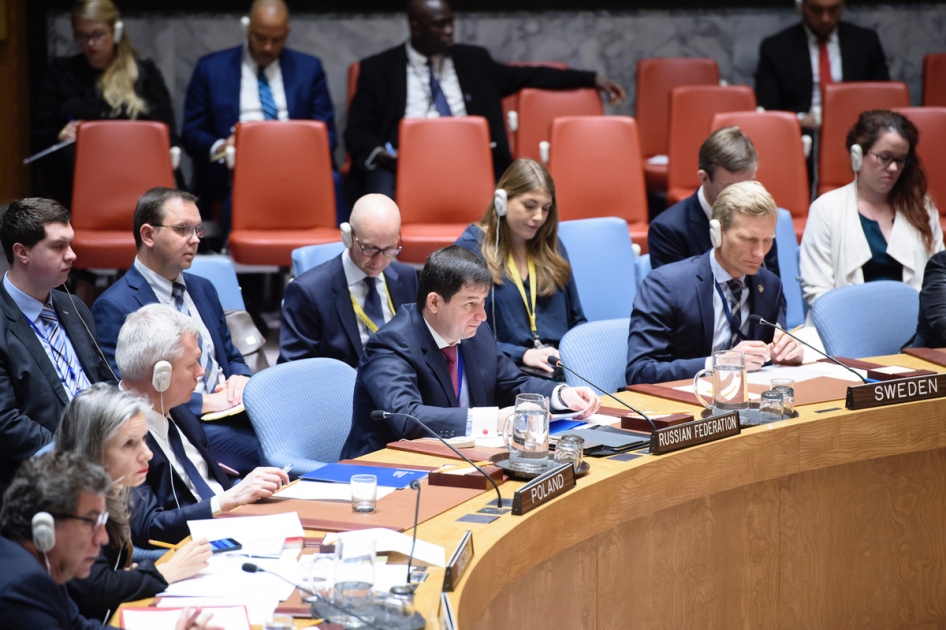Statement by Mr.Dmitry Polyansky, First Deputy Permanent Representative of the Russian Federation to the United Nations, at the Security Council on the sitiation in Haiti
We would like to thank Mr. Jean-Pierre Lacroix, Under-Secretary-General for Peacekeeping Operations, for presenting the report of the SecretaryGeneral after the transformation of the Organization’s presence in Haiti into the United Nations Mission for Justice Support in Haiti.
We consider the assessments made following his own recent visit to Haiti, from 14 to 15 March, especially useful. Since the middle of October of last year, when the Mission began its work in its new format, we have seen some unquestionably encouraging progress. We welcome the efforts of Haiti’s leadership to ensure stability and establish effective Government administration systems that rely on its own strengths.
In that regard, we are closely monitoring the implementation of President Jovenel Moïse’s Caravan of Change initiative. Coordinated and collaborative work on the part of the legislative, executive and judicial branches of power will be crucial to overcoming the country’s internal problems and laying a firm foundation for sustainable economic development. We note Haiti’s increased participation in the work of international and regional organizations.
In January it took on the rotating chairship of the Caribbean Community and joined the Community of Latin American and Caribbean States Quartet. The gradual, step-by-step progress has enabled the Council to begin to carefully consider the Secretary-General’s preliminary proposal for establishing benchmarks for the Mission’s exit preparedness and handing over its functions directly to the Government and the United Nations country team. In that regard, as with any other peacekeeping operation, it is important at every stage to take into account not only the views of the host Government but also the principle of national ownership.
However, there is still a great deal of work to do, both for the country’s authorities, which are being called on to become more self-reliant and independent of international support every day, as well as for the United Nations staff whose job is to provide them with the maximum support. That thorough, painstaking support is vital to the Government, which, taking the Haitian people’s views into consideration, must strive to identify its priorities and tasks on the security, politics, development and peacebuilding fronts. We should add that it is just as important to ensure that all national stakeholders understand the concept of shared responsibility for sustaining peace.
The ongoing serious humanitarian situation is still very worrying, since Haiti is still grappling with the effects of Hurricane Matthew. Also, despite the fact that people who were obliged to move to neighbouring States are now returning to Haiti is a very good sign, their growing numbers represent a special responsibility for the leadership of a country where 1 million people still need humanitarian aid. We are pleased with the Secretary-General’s information on the gradual improvement in the security situation and the falling crime statistics, including for sexual offences.
We hope that the strengthening of the National Haitian Police’s numbers to reach a total of 15,300 personnel, 9 per cent of whom are women, will help to achieve even greater progress. Against that background, the reports by representatives of Haitian civil society of sexual crimes committed by representatives of foreign non-governmental organizations are extremely worrying, and in the context of the ongoing efforts within the United Nations to combat such shocking offences, we urge the Mission not to ignore such scandalous examples.
These are very grave crimes that tarnish the image of international support generally. Any such reports should be investigated and those found to be responsible should not escape the punishment they deserve. The Council will soon have to agree on the draft resolution that will extend the Mission’s mandate for a year. In accordance with its mandate, the Mission will continue to assist the host country in ensuring the rule of law and strengthening the capacity of its law-enforcement bodies. The Council must be certain that adequate account is taken of the realities of the country’s situation, including with regard to the Mission’s structure, something that the Secretary-General also brings up in his report.
In conclusion, I would like to affirm our support to the Government and the people of Haiti, who have to overcome the destructive legacies of natural disasters as well as their domestic problems on their road to stability and prosperity. In order to ensure that they can recover more quickly, they need a strong State and a cohesive society through whose joint efforts they can build and strengthen Haiti’s potential.
